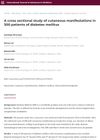 July 2013 in “Journal of clinical & experimental dermatology research”
July 2013 in “Journal of clinical & experimental dermatology research” Bimatoprost can help treat hair loss.
 180 citations,
January 2003 in “American Journal of Clinical Dermatology”
180 citations,
January 2003 in “American Journal of Clinical Dermatology” Menopause can lead to skin and hair problems due to hormonal changes, but hormone replacement therapy might help slow these effects.
 2 citations,
June 2023 in “Food science & nutrition”
2 citations,
June 2023 in “Food science & nutrition” Eating apples can help prevent heart disease, cancer, and other conditions because they have healthy plant chemicals.
 73 citations,
January 2013 in “European journal of dermatology/EJD. European journal of dermatology”
73 citations,
January 2013 in “European journal of dermatology/EJD. European journal of dermatology” Antioxidants may help fight oxidative stress linked to autoimmune skin diseases.

Zinc levels and lymphocyte counts might be important in heart disease development.
 166 citations,
March 2007 in “Hypertension”
166 citations,
March 2007 in “Hypertension” High androgen levels in young women with PCOS are linked to higher blood pressure.
 2 citations,
November 2012 in “InTech eBooks”
2 citations,
November 2012 in “InTech eBooks” The document concludes that sex hormones are crucial for mammalian reproduction, health, and behavior, and require more research for therapeutic use.
 72 citations,
November 2012 in “PloS one”
72 citations,
November 2012 in “PloS one” The protein folliculin, involved in a rare disease, works with another protein to control how cells stick together and their organization, and changes in this interaction can lead to disease symptoms.
 2 citations,
May 2023 in “Current Nutrition Reports”
2 citations,
May 2023 in “Current Nutrition Reports” Eating a Mediterranean diet and taking certain supplements may improve symptoms of PCOS.
 1 citations,
January 2023 in “Metabolites”
1 citations,
January 2023 in “Metabolites” Changes in gut bacteria can contribute to the development of Polycystic Ovary Syndrome (PCOS), affecting metabolism, immunity, and causing inflammation. Treatments may involve adjusting these factors.
 1 citations,
August 2021 in “Педиатр”
1 citations,
August 2021 in “Педиатр” Endocrine diseases in children often cause skin changes like dryness, redness, acne, hair loss, and more.
 12 citations,
September 2017 in “Molecular and Cellular Endocrinology”
12 citations,
September 2017 in “Molecular and Cellular Endocrinology” Testosterone significantly affects sexual desire in both men and women, but its impact on women is more complex and influenced by psychological factors.
 19 citations,
November 2021 in “Reviews in endocrine and metabolic disorders”
19 citations,
November 2021 in “Reviews in endocrine and metabolic disorders” Sex hormones like estrogen and testosterone may affect COVID-19 severity differently in men and women, potentially influencing prevention and treatment strategies.
 1 citations,
January 2019 in “International Journal of Advances in Medicine”
1 citations,
January 2019 in “International Journal of Advances in Medicine” Diabetics most often have skin infections and specific skin conditions related to diabetes.
 2 citations,
February 2023 in “BMC women's health”
2 citations,
February 2023 in “BMC women's health” Birth control pills change the activity of certain inflammation and blood clotting genes in women with PCOS.
 14 citations,
October 2021 in “Journal of Pediatric and Adolescent Gynecology”
14 citations,
October 2021 in “Journal of Pediatric and Adolescent Gynecology” In teens with Polycystic Ovary Syndrome and obesity, issues related to metabolism, skin, and mental health are common, and a clinic with various specialists can provide care for most of these problems.
 21 citations,
August 2014 in “Gynecological Endocrinology”
21 citations,
August 2014 in “Gynecological Endocrinology” Higher hs-CRP levels in Indian adolescent women with PCOS are more related to BMI than PCOS itself.
 54 citations,
January 2023 in “Signal Transduction and Targeted Therapy”
54 citations,
January 2023 in “Signal Transduction and Targeted Therapy” New therapies are being developed that target integrin pathways to treat various diseases.
 January 2023 in “Health science reports”
January 2023 in “Health science reports” French maritime pine bark extract significantly increased hair density in menopausal women.
 44 citations,
October 2011 in “Gynecological Endocrinology”
44 citations,
October 2011 in “Gynecological Endocrinology” Menopause significantly reduces skin collagen, leading to thinner, less elastic skin, and hormone replacement may help but requires careful consideration.
 14 citations,
September 2014 in “Journal of Pediatric and Adolescent Gynecology”
14 citations,
September 2014 in “Journal of Pediatric and Adolescent Gynecology” Irregular menstrual cycles in teenagers are linked to a higher risk of polycystic ovary syndrome and metabolic syndrome.
 343 citations,
December 2008 in “Endocrine Reviews”
343 citations,
December 2008 in “Endocrine Reviews” Metformin helps with menstrual cycles and insulin levels in PCOS but is less effective for hair growth, diabetes prevention, and weight loss, and may improve fertility and reduce diabetes risk.
August 2018 in “Daehan binyogi jong-yang haksulji” Taking sildenafil and finasteride together is safe and improves urinary and sexual symptoms in BPH patients.
2 citations,
September 2022 in “Frontiers in Nutrition” High-dose vitamin D3 does not improve symptoms or quality of life in COVID-19 patients after one year.
 76 citations,
May 2007 in “Menopause International”
76 citations,
May 2007 in “Menopause International” After menopause, women lose a lot of skin collagen, but estrogen replacement might improve skin health.
24 citations,
November 2015 in “Frontiers in Genetics” Nitroxide drugs can safely and effectively treat age-related diseases like macular degeneration and cardiovascular issues.
 15 citations,
January 2018 in “Biomedical Reports”
15 citations,
January 2018 in “Biomedical Reports” Exosomes are important for skin health and could help diagnose and treat skin diseases.

Women with PCOS are at higher risk for gum disease, and managing shared risk factors can help both conditions.
 48 citations,
January 2015 in “Indian Journal of Dermatology, Venereology and Leprology”
48 citations,
January 2015 in “Indian Journal of Dermatology, Venereology and Leprology” Vitamin D is important for skin health and can help treat psoriasis, atopic dermatitis, and vitiligo.
 120 citations,
October 2007 in “Clinical Interventions in Aging”
120 citations,
October 2007 in “Clinical Interventions in Aging” Estrogens help reduce skin aging, and SERMs might offer similar benefits without the risks of hormone therapy.



























